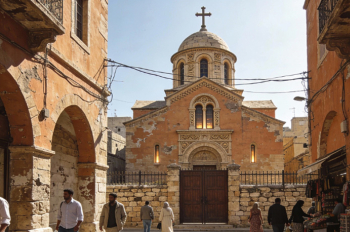
Christianity is at risk of being “wiped out” in parts of the world due to intensifying persecution, the United Kingdom’s special envoy for freedom of religion or belief, David Smith, has warned. The British government is now targeting 10 countries as part of its revised foreign policy focus to defend this human right.
Smith, the Labour Party MP for North Northumberland, made the remarks during a briefing at the Foreign and Commonwealth Development Office. A Christian who previously worked with Tearfund and the Bible Society, he announced a new plan to prioritize FoRB in countries where religious minorities, including Christians, Baháʼís and Ahmadiyya Muslims, face repression or violence, the Religion Media Centre reported.
Smith said the U.K. will focus on 10 countries, naming Vietnam, Algeria, India, Nigeria, Pakistan, China, Syria, Ukraine, Afghanistan and Iraq. He said these were selected because of the severity of need, the U.K.’s diplomatic ties and the possibility of making progress.
He added that persecution, carried out both by governments and social groups, can involve harassment by police, social ostracism, detention without cause, denial of citizenship, torture, attacks on places of worship and even killings, citing research by the Pew Research Center.
He cited recent data showing that 380 million Christians face persecution worldwide and warned, “Persecution on the basis of religion or belief, enacted by States themselves and social groups, is taking place on every continent in the world.”
Smith called the U.K.’s commitment “a new chapter” in foreign policy and said freedom of religion was interlinked with other liberties, including freedom of speech, conscience and assembly.
Of the 10 selected, only three — Nigeria, Pakistan and Afghanistan — are among the top 10 in the Open Doors World Watch List, which identifies countries where Christians are most severely persecuted. The worst offenders on that list, such as North Korea, Somalia and Yemen, are not among the U.K.’s current priorities.
Smith acknowledged the gap and said that countries like Eritrea and Yemen remain within his scope through ongoing advocacy. He stated that the strategy’s targeted nature does not prevent the U.K. from acting in other cases, including on behalf of prisoners of conscience.
He referred to the Ahmadiyya community in Pakistan, who are not recognized as Muslims by the state and whose mosques are often desecrated, and the repression of Baháʼís in Iran and Christians in North Korea.
FoRB, Smith explained, is not merely about religious belief but about the health of societies. “Religious intolerance and persecution can fuel instability and conflict,” he said. He added that protecting belief rights is crucial to preventing future crises, especially in countries grappling with war or sectarian divisions.
The U.K. government’s FoRB strategy involves five strands.
First, it aims to uphold international standards through bodies such as the U.N. and the Organization for Security and Co-operation in Europe. Second, it will embed the issue into targeted bilateral diplomacy, encouraging individual missions to raise FoRB in foreign capitals. Third, the U.K. will strengthen international coalitions working on religious freedom. Fourth, the Foreign Office will incorporate FoRB into its mainstream human rights programming. The fifth strand involves collaboration with civil society groups working on interfaith respect and awareness.
Speaking at the briefing, Lord Collins of Highbury, minister for human rights, said the U.K. has long believed that rights and the rule of law strengthen global prosperity and resilience. He said his office had already written to British heads of mission directing them to embed human rights, including FoRB, into all areas of diplomatic work.
He cited the recent release of two individuals — Nigerian atheist Mubarak Bala and Cuban Pastor Lorenzo Rosales Fajardo — as examples of successful British-supported advocacy.
“Only by working together can we build a world where everyone, everywhere, can live with dignity, free to believe — or not believe — without fear,” Lord Collins said.
In April, during a debate, Smith said Britain’s diplomatic stance is informed by its own history, moving “from persecution to pluralism,” which he said provides credibility to advocate abroad. He described the U.K. as “uniquely well placed” to act in support of religious liberty, citing its legacy of legal rights and peaceful pluralism.
The role of FoRB envoy was created following a 2019 report by then-Bishop of Truro Philip Mounstephen, which found that Foreign Office staff lacked awareness of global religious persecution. The report led to recommendations that religious freedom be formally integrated into U.K. foreign policy.
Smith argued that defending FoRB not only benefits persecuted communities but also those who engage in repression. He said FoRB could unlock new opportunities and freedoms for their nations to flourish, and reaffirmed his commitment to press the U.K. government to act.
Meanwhile, Christian Today noted that new research by Jersey Road PR has found that mainstream U.K. media rarely report on attacks against Christians globally.
Originally published by the Christian Post.






